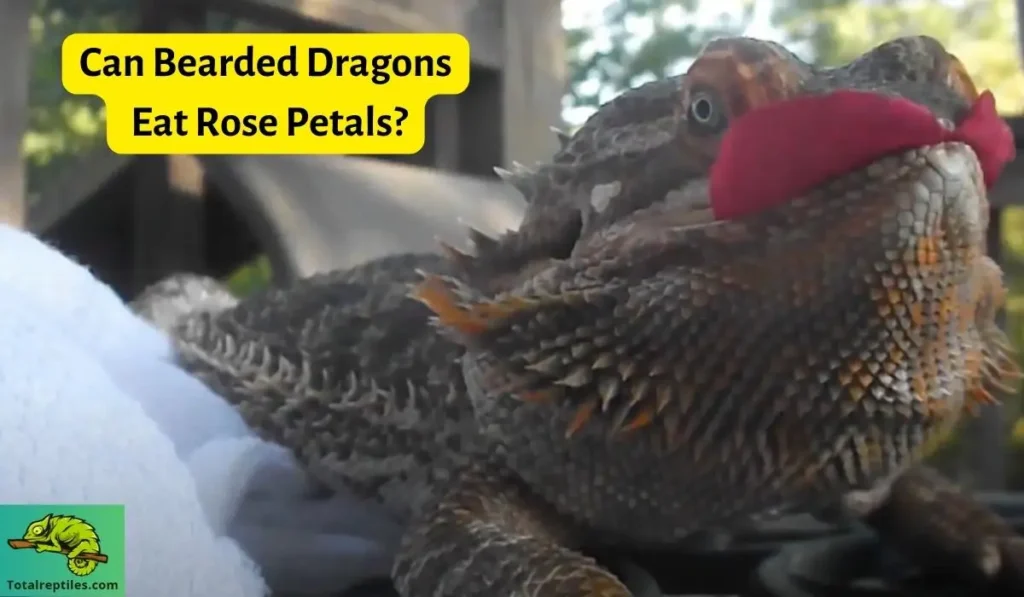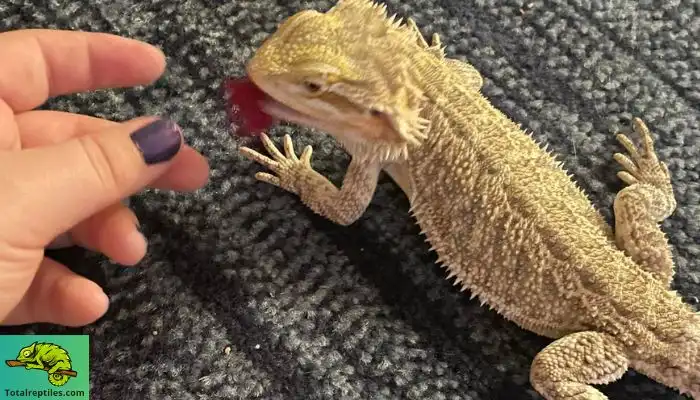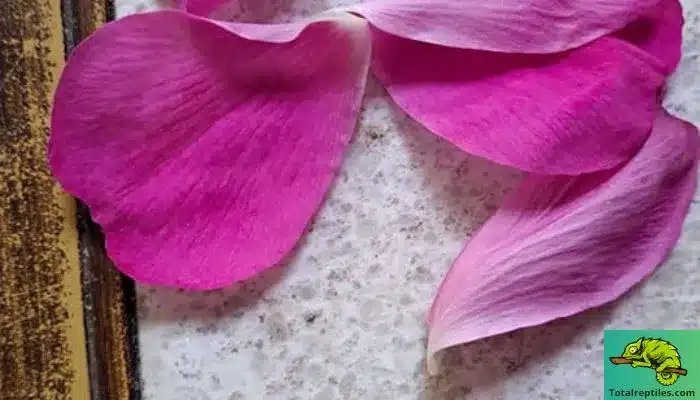These enchanting reptiles can relish the occasional indulgence of this floral delight. However, like any sophisticated palate, moderation is a must.
Offer your bearded friend small portions of properly prepared rose petals, ensuring they are free from any unwanted elements like parasites or pesticides.
So, if you’re eager to add a dash of botanical flair to your bearded dragon’s dining experience, read on to discover the art of preparing this exquisite snack.
Get ready to watch your reptilian companion bask in the delicate allure of rose petals!

Feeding Rose Petals to Bearded Dragon: Potential Benefits And Risk Factors
Here, we’ll explore the advantages and cautions of incorporating rose petals into bearded dragon’s meals.
Benefits:
Nutritional Variety: Rose petals can offer a diverse range of nutrients, including vitamins A, C, and K, as well as antioxidants. Adding these elements to a pet’s diet can contribute to overall health and well-being.
General overview of the potential nutrients found in rose petals:
| Nutrient | Amount per 100g (approximate) |
| Calories | 162 |
| Carbohydrates | 39g |
| Protein | 0.8g |
| Fat | 0.6g |
| Fiber | 1.6g |
| Vitamin A | 1573 IU |
| Vitamin C | 60mg |
| Vitamin K | 14.6mcg |
| Calcium | 36mg |
| Iron | 0.5mg |
| Magnesium | 3mg |
| Phosphorus | 8mg |
| Potassium | 88mg |
Hydration Support: Rose petals contain a significant amount of water, aiding in hydration for your bearded dragon. This can be particularly beneficial in hot climates or during periods of low water intake.
Enrichment and Stimulation: Introducing new textures and flavors, such as rose petals, can provide mental stimulation and enrichment for your bearded dragon. It adds variety to their diet and encourages natural foraging behaviors.
Learn more: What Flowers Can Bearded Dragons Eat?

Risk Factors:
Pesticides and Chemicals: Ensure that the rose petals you offer are free from pesticides and other harmful chemicals. Commercially grown roses are often treated with chemicals that can be toxic to reptiles. Opt for organic or pesticide-free roses, or grow your own roses without the use of chemicals.
Digestive Issues: Bearded dragons have sensitive digestive systems, and consuming excessive amounts of rose petals can lead to gastrointestinal upset, including diarrhea. It’s crucial to offer them in moderation and observe your pet for any adverse reactions.
Allergic Reactions: Just like humans, bearded dragons can have allergies. While rare, some dragons may exhibit allergic reactions to rose petals.
Monitor your pet closely after introducing them to this new food, and watch for signs of allergic responses, such as itching, swelling, or difficulty breathing.
Potential Intestinal Blockage: Rose petals, especially if not properly prepared, can contain thorns or other indigestible parts.
Before offering rose petals to your bearded dragon, remove any thorns and chop them into small, manageable pieces to reduce the risk of intestinal blockage.
List of Safe Rose Types for Bearded Dragon
When selecting roses for your bearded dragon, choosing varieties that are safe and free from harmful chemicals is important. Here is a list of safe rose types that can be considered:

- Rosa rugosa (Japanese Rose): This variety is known for its hardiness and disease resistance. It is often grown organically and can be a safe option for your bearded dragon.
- Rosa gallica (French Rose): These roses are classic and have been cultivated for centuries.
- Rosa damascena (Damask Rose): This fragrant rose variety is commonly used in the production of rose oil and rose water.
- Rosa centifolia (Cabbage Rose): Also known as the Provence Rose, this variety is popular for its numerous petals.
- Rosa alba (White Rose): With its elegant white flowers, this rose variety can be a safe choice for your bearded dragon.
- Rosa canina (Dog Rose): This wild rose species is often found growing naturally.
Notes:
- Remember to always source roses from reputable sources, such as organic suppliers or those specifically catering to pesticide-free options.
- Avoid roses purchased from florists or those treated with chemicals intended for ornamental use.
Preparing Rose Petals For Bearded Dragons – Step By Step
Follow these guidelines to properly prepare rose petals for bearded dragon:
Step-1: Select Safe Roses
Choose organic or pesticide-free roses. Avoid roses from florists or those treated with chemicals, as they can be harmful to your bearded dragon.
Step-2: Thoroughly Wash
Rinse the rose petals under cool running water to remove any dirt, debris, or potential residue. Gently pat them dry with a clean towel.
Step-3: Remove Thorns
Carefully remove any thorns from the rose petals using clean tweezers or scissors. Be thorough to eliminate the risk of injury or digestive issues.
Step-4: Chop into Small Pieces
To make the rose petals easier for your bearded dragon to consume and prevent choking, chop them into small, bite-sized pieces. Ensure the pieces are appropriate for the size of your reptile.
Step-5: Offer Moderately
Rose petals should be offered as an occasional treat, not as a primary food source. Start by offering a small amount, such as a few petals, and observe your bearded dragon’s reaction.
Step-6: Monitor for Adverse Reactions
After feeding rose petals for the first time, closely monitor your bearded dragon for any signs of allergic reactions or digestive issues. If you notice any adverse effects, discontinue feeding rose petals immediately and consult a veterinarian.
Conclusion
Incorporating rose petals into your bearded dragon’s diet can be a delightful and enriching experience. Just choose safe, pesticide-free roses and offer them in moderation.
These aromatic treats can provide scaly companions with a unique source of hydration, added nutrients, and mental stimulation.
By following the above guidelines, safely introduce bearded dragons to the world of floral indulgence and witness them relish the elegance of rose petals.

